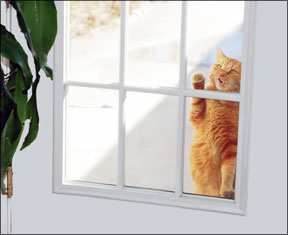Do you ever find yourself playing servant to your cat? Maybe youre working on the computer and your clever cat lies down across the keyboard to get your attention. Next thing you know, youre stroking the cat instead of striking the keys. Perhaps youre watching TV, sleeping or just relaxing and your feline rubs up against your leg, hand or even face to let you Bev Caldwell 288 know its time to eat. Or your cat may follow you from room to room, pausing to wind around your ankles. Sometimes cats, after getting the attention of their human companions, actually lead them to their food dishes. So what do you do? You feed your cat, of course. The loud purring that follows is music to your ears. A Two-Way Street. “Every day, someone tells me how his cat has trained him to wake up at the same time every morning to feed him, or gets him to play when all he wants to do at that time is relax,” says Ellen Lindell, VMD, who is board-certified by the American College of Veterinary Behaviorists. “Actually, training between cats and humans seems to go in both directions,” explains Dr. Lindell. Speaking strictly in behavioral terms, “cats or any animal will repeat behavior that gets a response. Even if the response does not occur every time, the connection is still there,” she explains. “In fact, an intermittent reward schedule intensifies the behaviors.” For example, say youre tired of getting up at 5 a.m. to feed your cat, whose early-morning ritual is to jump on your bed and lick your face. So you decide to ignore her affectionate demands. One day passes, two days, three days and then, on the fourth day, you cant ignore her anymore, because shes driving you crazy. So you get up and feed her. Wham! Thats all it takes. Your cat will keep waking you up at 5 a.m. every morning until you relent. Its the same reward principle that compulsive gambling is based on. Your cat “thinks” that, if it happened once, it can happen again. Cats and Human Bonding. While we can explain things in strict scientific terms, there does seem to be something else going on here. “The training between cat and human is mutual,” says Dr. Lindell. “As humans, we agree to be trained. We do things that our cats want because its part of a relationship that benefits us both. Its a give-and-take relationship – a friendship between two different creatures.” For example, our cats get our attention in several different ways when they want to be petted or scratched. We, in turn, often stop what were doing to oblige them because we enjoy the purring that follows or the endearing looks we get from them. The purring, the half-closed eyes and the look of contentment are the reinforcements or rewards that keep us reacting to them. “Comparing cats and dogs, cats need to be more motivated to do things we want them to,” says Dr. Lindell. “However, when cats want us to do something, they can learn to be quite creative.” When youre reading or talking on the phone, for example, your cat may cry to get your attention. Perhaps that doesnt work. So then your cat reaches up to your knee and then climbs up to pat your face. Your smart cat is actually adding to her repertoire of antics to get your attention. If one thing doesnt work, she will try another. “Cats learn quickly what behaviors are rewarded and they learn to repeat them,” says Dr. Lindell. “Right from the time theyre kittens, they learn what gets humans to do what they want: play, cuddle and feed.” Not all cats “train” their humans the same way. If youve lived with several cats over your lifetime, then you will know that each cat has his own way of picking behaviors that work for him. “It really does depend on the personality of the cat,” says Dr. Lindell. If you live with more than one cat, you may notice that your cats often act differently with one family member than another. When we react positively to our cats and therefore oblige them, we get the chance to get to know them better as individuals. “The relationship between the feline and the human species is a matter of give and take. Some cats seem to take more than they give,” says Dr. Lindell. Sometimes it does seem like we are at our cats beck and call. But really, would you have it any other way?



